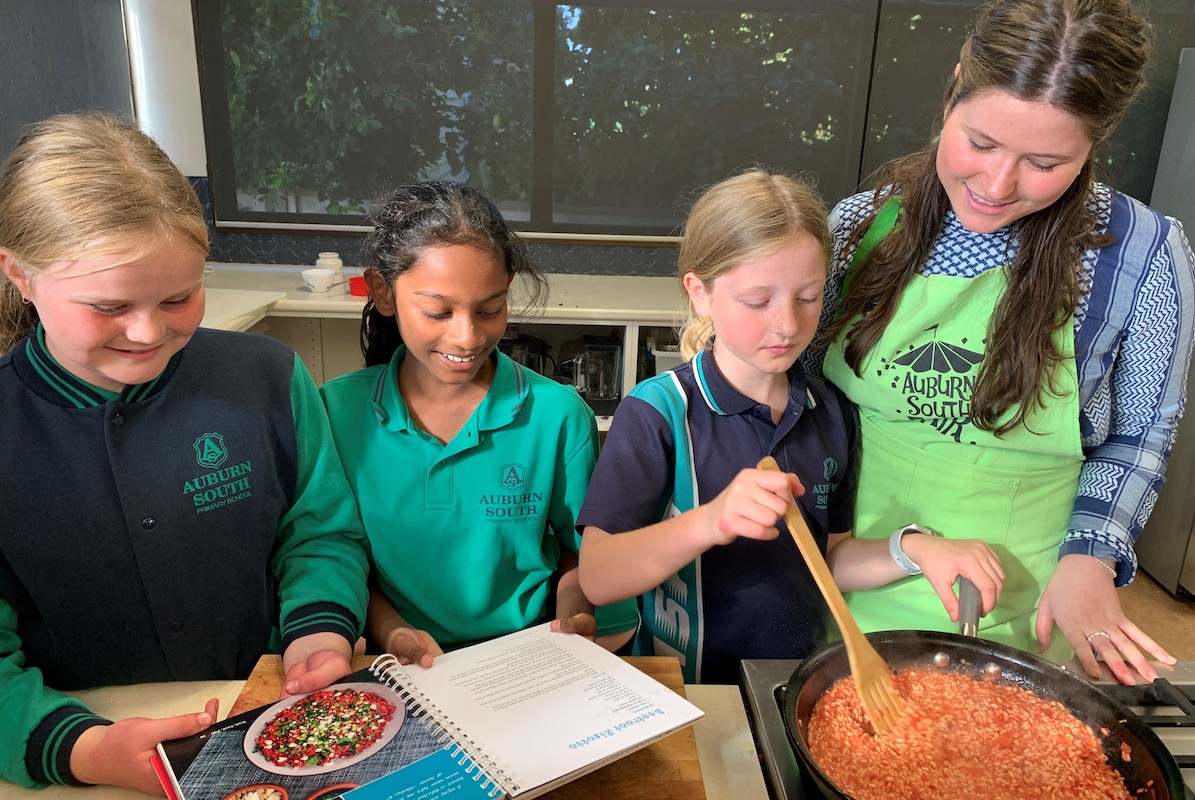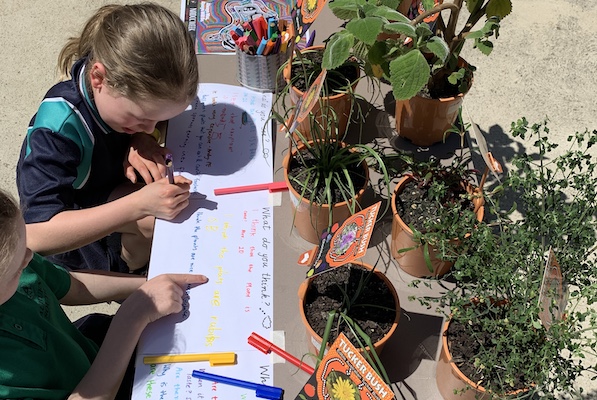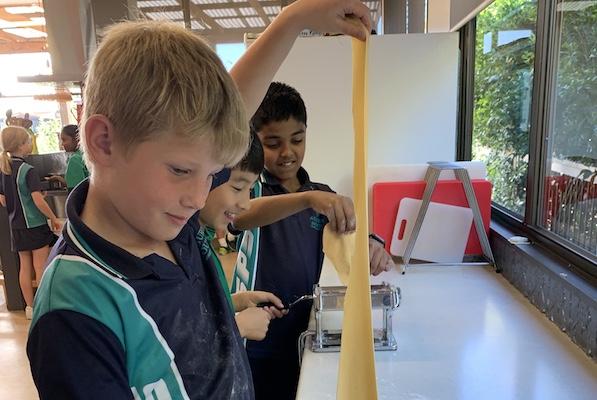Auburn South Primary School celebrates 10 years of their kitchen garden program

They finish each other’s sentences and blurt out the word that the other one is trying to think of. This is a partnership that has seen Auburn South Primary School’s Stephanie Alexander Kitchen Garden Program grow into a thriving life experience over the past decade. Emily Hui reports on Karen Morwood and Andrea Clements, the duo behind the success, who went from online cooking classes during remote learning to creating their own cookbook.
The dynamic duo
Karen Morwood is the kitchen specialist who has taken great pride in seeing this program grow from “absolutely nothing to this beautiful space that it is now”. She claims she didn’t bring “any real skills” to the program except her love of cooking, which she refers to as “just basic cooking, not a fancy cook at all”. However, in the same breath, Karen speaks with pride of how she surprises even herself with “just being able to come up with recipes that can actually feed 30 people at a time that they eat”. That she succeeds is clear – Karen sure knows how to command five kitchens full of keen primary students bustling around preparing, cooking, eating and cleaning up in less than 100 minutes. Chaos, but organised chaos and a bit of magic thrown in!
Her partner in crime, Andrea Clements, is the garden specialist. Andrea studied at Burnley, becoming a horticulturalist specialising in ornamental gardening. Stepping into food crops for the SAKG Program was a “steep learning curve” for Andrea, and she now believes that she’s got a “pretty good handle on vegetables, and fruit”. She attributes that to years of trial and error, and learning and upskilling in areas such as growing fruit, espaliering fruit trees and growing fruit trees in different ways.
Karen and Andrea didn’t really know each other before they started, but feel so “blessed” and “lucky” ten years on. These two both swear that their partnership is a big contributor to the success of the kitchen garden program. The staff and parents echo this in expressing their gratitude for Karen and Andrea. Year 5 Teacher Julian Van Marle, who has been part of the program since the start, says, “Without those two, the beautiful garden and kitchen set up just wouldn’t be the same.” Karen and Andrea are truly at the heart of the success of this program.

Bush foods provocation, Auburn South Primary School
Tip 1: Relationships matter
The seed for the Stephanie Alexander Kitchen Garden Program at Auburn South was planted by a group of energetic parents, led by a parent at the school, Carolyn Creswell, who was on the board of the Stephanie Alexander Kitchen Garden Program. At the time, government funding was available for schools to join the program; we applied for a grant and were successful. Our plans outgrew the original grant, but this has proven to be a long-term benefit as we have continually added them over the years, including a large water tank storage system, a pizza oven and an outdoor preparation sink space. The principal and assistant principal at the time, Gary Campbell and Con Pakavakis, respectively, were also super supportive and really helped drive this, building some solid foundations for the program.
Tip 2: The power of support – leadership support and community support
The Auburn South program began in an old small portable that was also a science room. Every day, classes would carry over plates, knives and forks, set up trestle tables, and huddle over one stove. It was simply making do with what we had. In the garden, some of the classes planted donated plants. The program built up slowly for the first five months before the purpose-built facilities were completed.
Tip 3: Use what you have first
Initially, there was a building on the current location of the program area. The school was going to rearrange it and renovate it, but realised they actually needed a purpose-built building. So three portables were joined together and a lovely deck was added; it went from there.
Tip 4: Broaden and build – purpose-built areas = better learning environment
Julian recalls the humble beginnings when the program began with one sink and about three chopping boards in the ‘old cottage’ (science room) and Year 3 and 4 students making smoothies and sandwiches. He reminisces fondly, sharing stories over the years, such as the time when his class worked in a line passing wooden logs to each other to stack up for the newly established pizza oven. The program ties into many parts of the curriculum, but it’s the incredible moments, skills and memories have been made in the program that bring so much value. For some students, spending time in the kitchen garden is a strategy that aids the student in their individual learning improvement plans.
Tip 5: See the opportunities beyond the curriculum
Julian has seen the incredible changes over the years, more recently with Year 2s joining the program which goes all the way up until Year 6, culminating in a ‘Masterchef’ challenge where students develop and cook their own recipes. Principal Marcus Wicher extended the program from Year 3–4 to Year 5–6 as we could see such great benefits of the program and it would have been a shame not to continue to grow the kitchen and garden skills. Now with the addition of Year 2, as Julian rightly puts it, “There really isn’t a kid who doesn’t enjoy it.”
Tip 6: Test it, then scale it
The kitchen garden is a space for diverse learning opportunities. Teachers have used it for maths measurement sessions (for example, the perimeter, area and volume of the garden and the garden beds), bug hunt for an inquiry, visiting the chooks to learn about their life cycle, flowcharting the embodied energy of growing local compared to buying from a supermarket, experiencing mindful and healthy eating practices, botanical drawing, observing and recording the changes in the season (seeing what is growing) and inspiration for a writing piece... the opportunities are endless.
Andrea highlights how powerful it is be part of the solution through our whole-school composting, and to see and reap the benefits of that. It is also powerful to see nature in action – seeing how the pollination process works by “actually going down and seeing the flower, the little fruit, all that that is happening right there in front of you”.
Tip 7: Create opportunities for observing, connecting and learning outdoors in nature
Over the years, students and teachers have shared so many wonderful moments together. Some that were highlighted recently include: a student trying something new and discovering they really like or they’re good at it; a student asking for the recipe then cooking it at home for their family; the triumph of students eating something they had planted in the garden; observing the seasons change and how that is reflected in the garden; and celebrating solstices.
Some students who struggle in the classroom environment thrive in the kitchen and garden. Some just love doing work that’s really physical, such as pushing wheel barrows (with their wheel barrow licence, of course) and moving dirt, or building frames and digging.
Tip 8: Be open-minded for potentials and possibilities
The recipes have been so popular that Karen and Andrea published their own Auburn South Primary School Stephanie Alexander Kitchen Garden Cookbook in 2018. The book contains 101 pages of savoury and sweet recipes that were tested and loved by the kids at the school, as well as quotes from the kids and beautiful photos. It’s a real testament to the success of the program. Karen ran cooking classes using recipes from the cookbook during remote learning that were so popular we had to increase our Zoom capacity to fit all the families in!
Tip 9: Collect and collate a recipe cookbook of memories
The program also involves parents like Ping, who volunteers as a kitchen garden helper. She loves coming in to spend time with her kids and their friends and being involved with the school. It’s a beautiful time for parents to connect with other parents and grandparents that come in, as well as their child’s teacher. The bonus is getting new ideas for cooking at home that the kids can be involved in – whether that is a meal or a muffin for their lunch box. Ping’s most recent discovery has been making egg noodles from scratch – how amazingly easy and delicious it is! The program inspired Ping and her family to take up pasta making at home and it even was their ‘family lockdown project’ last year.
Tip 10: Connect and build community
The often unseen consequences of the program were witnessed at a recent Year 5 camp where the camp kitchen staff were surprised at how efficient the students were at setting up, sharing the meal and cleaning up afterwards. Students knew how to work with each other in the kitchen and dining space. They knew these jobs needed to be done so there were no complaints because it was part of their school experience. They were open to trying the variety of camp food that was placed on their plates, expressed their gratitude to the camp chef and kitchen staff for the food and were grateful they didn’t have to do the dishes (due to COVID-safe camp regulations) – which they do as part of the Kitchen Garden experience. They had wiped the tables and benches, swept the floors and were all done in the time before many other camp groups had even finished eating their main meal. Needless to say, there are many more positive rippling effects of the Kitchen Garden than just the experience at the time.

Pasta making, Auburn South Primary School
Next up
Community – We have run a few workshops for the community in the past and one of the plans is to engage the community more. There are occasional sales of excess produce, and it is an area we are keen to expand with the students. There are always many more ideas in the works!
Connection – We are working towards building and extending our bush foods garden with the help of First Nations educator and conservationist Dean Stewart, a Wemba Wemba-Wergaia man of Aboriginal Tours and Education Melbourne, who is passionate about custodian ecology. We have three small bush food gardens – one in the native plants garden, ones in the community herb plots and one down in the main kitchen garden area. We hope to eventually grow enough to integrate bush foods into the whole Kitchen Garden Program
As we can see, the Kitchen Garden connects people with nature – to be part of nature, to observe and learn with nature. We learn to respect, appreciate and care for nature individually, as well as being part of a team. We see that food is part of a connected process, to eat well is to be well. To see the variety of food but also the variety of ways to enjoy a certain vegetable. The program is completely vegetarian, but there’s enough flavour and variety that there are only compliments about how delicious things are. And we certainly know what’s in season as we see the pumpkins take over the garden then be harvested onto the harvest shelf and become pumpkin soup, pumpkin gnocchi, pumpkin salad and more. It’s not just the food; it’s the relationships, the skills, the knowledge and the memories made that make this such a worthwhile part of school and life!
Final top tips from the duo
Karen: You need good support. Principal and leadership support, ones that really support you. We also have great parental support that really values the program. You need to be valued. I don't think you could go on your own, even if it's your passion and no one else has got the energy to go with you. Whereas I think we both have the energy.
Andrea: If you've got that supportive network, from a practical point of view, get your trees in ASAP. Get your foundation plants in quickly, because that's what takes time for the garden to mature. Like, get your apples in, get your asparagus in and get all your perennials in!
Resource recommendations from Karen and Andrea:
Stephanie Alexander’s Kitchen Garden Companion: Growing – dig, plant, water, grow, harvest, 2016, Penguin Random House
The new organic gardener, D Schultz, 2011, ABC Books
This article was first published in Eingana the magazine of Environment Education Victoria, June 2021.
It was authored by Emily Hui, a primary and secondary trained educator and facilitator who is teaching Year 5 at Auburn South Primary School on Wurundjeri Country. She is the school’s sustainability coordinator, a home balcony and mini farm wall aquaponics gardener, and a frequent farmers market shopper. Emily is passionate about empowering changemakers, and is a member of the school’s Green Team of students, staff and parents taking action towards a flourishing planet.
< Back to Latest News
